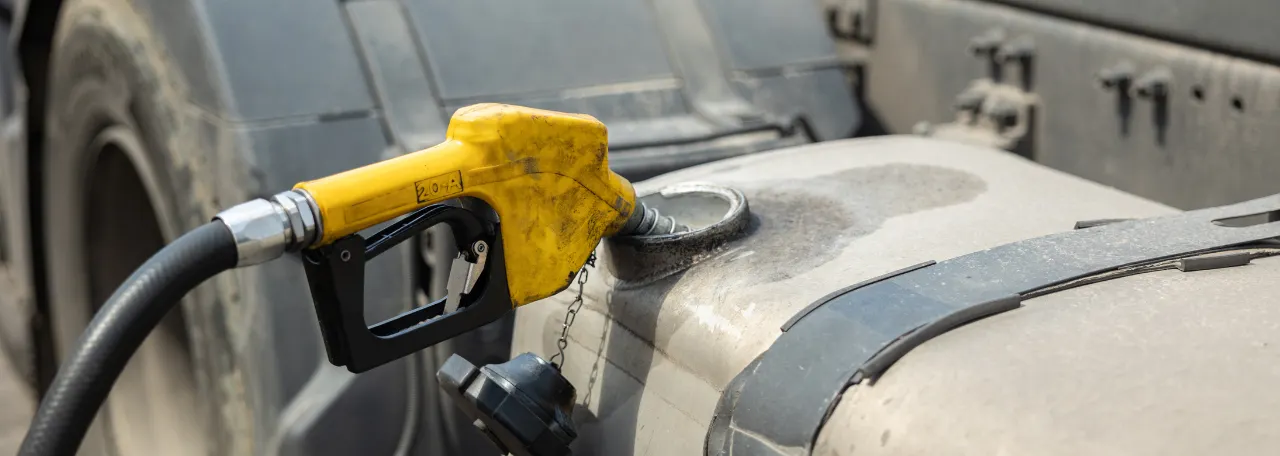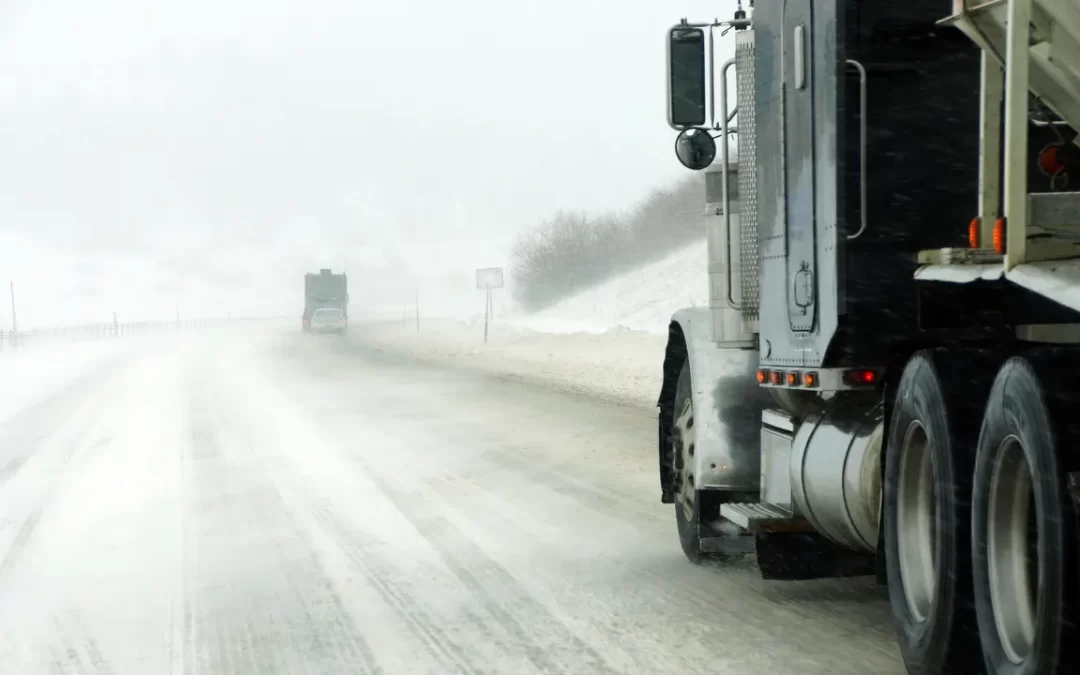Speed and Following Distance

When driving in adverse conditions, the first and most crucial safety tip is to slow down. Icy roads can significantly reduce tire traction, and poor visibility could further complicate matters.
By reducing your speed, you allow yourself more time to react to changing traffic and road conditions. It’s important to remember that speeding is a leading contributor to fatal crashes, and slowing down could make all the difference in ensuring your safety and the safety of others on the road.
Another key safety measure is to increase your following distance. Wet or icy conditions can double the stopping distance compared to dry roads. The weight of a fully loaded trailer also impacts braking ability, requiring even more space to stop safely. Maintain a generous distance between your truck and other vehicles on the road to avoid collisions.
Also, try to avoid sudden movements while driving. Quick changes in speed or direction can lead to skids. Instead, aim to accelerate, brake, and steer smoothly and gradually, maintaining control over your vehicle at all times.
Fuel Management

To reduce the risk of running out of fuel during unforeseen delays, always keep your tanks half full. This practice also curbs condensation within the tanks, which, if unchecked, can result in fuel line freezing.
Pay close attention to your fuel filters and water separators, especially during cold weather. The low temperatures can cause water to freeze in the fuel filter, consequently blocking fuel flow. Regular checks and draining of these components are therefore necessary to maintain optimal functionality.
Also, using winterized fuel can significantly improve your vehicle’s performance in low-temperature climates. This type of fuel contains additives that inhibit gelling when the temperature drops. It is important to ensure you use the right fuel that matches the climate of your route for optimal performance and efficiency.
Preventing Damage to Wiper Blades

Before ending the day and shutting down your vehicle, it’s a good practice to pull the wiper blades away from the windshield. This simple action can prevent the blades from freezing onto the glass overnight, which could cause damage or reduce their effectiveness. It’s a small step that can significantly prolong the life of your wiper blades and ensure they’re ready to work when you need them.
Another useful tip for maintaining a clear windshield, especially in cold weather, is to use a de-icing fluid. Windshield wiper fluid that comes with de-icing properties can aid in keeping the windshield clear of frost and ice. Additionally, this type of fluid can help prevent potential damage to the wiper blades that could be caused by frozen debris.
Don’t forget the importance of regularly cleaning your wiper blades. Ice and snow can build up on the blades over time, reducing their ability to effectively clear the windshield. By routinely removing this buildup, you can maintain the effectiveness of your wipers and preserve their condition. A clear windshield is crucial for safe driving, and well-maintained wiper blades play a key role in achieving this.
Efficiently Warming Your Truck
When you start your truck, follow a gradual idling process. This method enables oil to circulate throughout the engine before you start driving. Gradual idling is not merely a start-up routine; it also serves a crucial role in warming up the engine more efficiently. This practice can help avoid unnecessary wear and tear on the engine components, thereby extending the lifespan of your vehicle.
For those long, cold nights when you want to keep the cab warm but don’t want to idle the engine continuously, a bunk heater can be an excellent alternative. Bunk heaters are designed to provide warmth without the need for the engine to run, making them a more fuel-efficient option. By using a bunk heater, you can create a comfortable environment in the cab while saving on fuel, making it a practical solution for truckers during the colder months.
Avoiding Injuries

When navigating icy conditions, one of the first things to consider is your footwear. It’s essential to choose shoes with good traction to help prevent slips and falls on slippery surfaces. This type of footwear provides a more secure grip, helping you maintain balance while walking on ice or snow-covered grounds.
In addition to wearing the right shoes, it’s also important to exercise caution when exiting your truck. Always make sure to hold onto the door handle or handrails as you get out to avoid slipping or losing your balance on potentially slick ground. These supportive structures can provide the extra stability you need when stepping onto uncertain terrain.
Lastly, remember to use the ‘three points of contact’ rule when climbing into or out of the cab. This rule means that at any given time, three out of your four limbs should be in contact with the vehicle. For instance, this could be two hands and one foot, or vice versa. Maintaining three points of contact can significantly reduce the risk of falling, making it a simple but effective safety measure to adopt.
Preparing Your Vehicle for Inclement Weather

A crucial aspect of vehicle maintenance, especially in inclement weather, is tire inspection. Ensure that your tires have adequate tread depth, as this can greatly improve traction on slippery surfaces. Also, proper inflation is key for optimal performance. Tires that are correctly inflated can provide better grip, enhance fuel efficiency, and reduce the risk of blowouts, contributing to a safer and smoother ride.
Another component that demands attention is the battery. Cold weather can be particularly hard on batteries, often leading to reduced power or complete failure. To prevent such issues, it’s important to ensure that your battery is fully charged and functioning properly. Regular inspections can help identify potential problems early and keep your vehicle running efficiently.
Be prepared for emergencies. Always keep a pack of emergency supplies in your vehicle. This kit should include blankets, food, water, a flashlight and a first aid kit to sustain you in case of a breakdown. Some extra clothing can provide warmth in cold conditions. A toolbox with some essential tools can also be invaluable if there is a quick fix that you can complete yourself. These preparations can make a significant difference in critical situations, providing comfort and safety when you need it most.
Looking for safe and reliable Expedited Freight Services?
Give Straight Shot Express a call today at (920) 722-0956.

